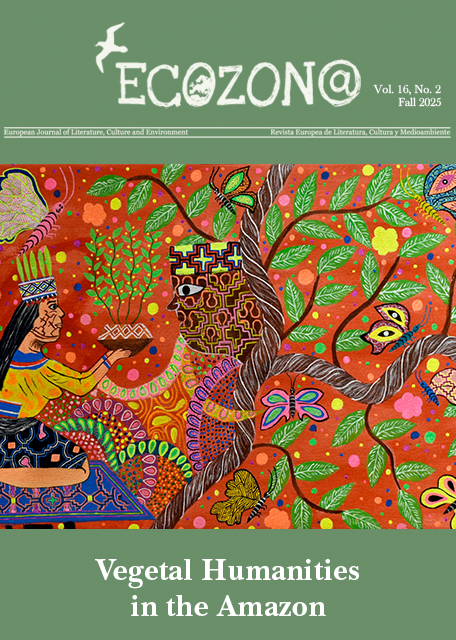Anthropocenic Futures and Precarious Bodies. A Reading of "Mugre rosa" (2020) by Fernanda Trías
DOI:
https://doi.org/10.37536/ECOZONA.2024.15.2.5192Schlagworte:
Precarious bodies, Anthropocene, Illness, Fernanda Trías, Mugre rosaAbstract
Mugre rosa (2020), by Uruguayan author Fernanda Trías, depicts a near-future Montevideo, where the population is confronted with climatic disaster and the propagation of a devastating disease. In this article, I explore the representation of bodily precarity in the context of environmental catastrophe, arguing that this vulnerability constitutes a point of resistance from which to rethink human identity. On the one hand, exposure to an anthropogenic environment is interpreted as instrumental to late capitalist biopolitics. This is revealed through the cartographies of precarity emerging from the novel, which reflect not only the chasm between Global North and Global South but also local inequalities. On the other hand, this corporeal exposure constitutes a challenge to traditional representations of the human. Through the analysis of the depiction of the illness, I discuss how this deconstruction of the body favours the emergence of a new, interconnected identity. Ultimately, I suggest that a destabilising age such as the Anthropocene constitutes not only a profound moment of crisis but also a privileged space to rethink human subjectivity and its modes of representation.
Downloads
Downloads
Veröffentlicht
Ausgabe
Rubrik
Lizenz
Authors who publish with this journal agree to the following terms:
a) Authors retain copyright and grant the journal right of first publication with the work simultaneously licensed under a Creative Commons Attribution License that allows others to share the work with an acknowledgement of the work's authorship and initial publication in this journal (CC BY-NC for articles and CC BY-NC-ND for creative work, unless author requests otherwise.
b) Authors are able to enter into separate, additional contractual arrangements for the non-exclusive distribution of the journal's published version of the work (e.g., post it to an institutional repository or publish it in a book), with an acknowledgement of its initial publication in this journal.
c) Authors are permitted and encouraged to post their work online (e.g., in institutional repositories or on their website) prior to and during the submission process, as it can lead to productive exchanges, as well as earlier and greater citation of published work (See The Effect of Open Access).










